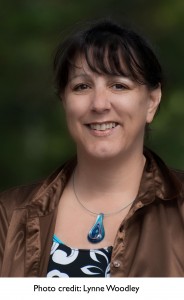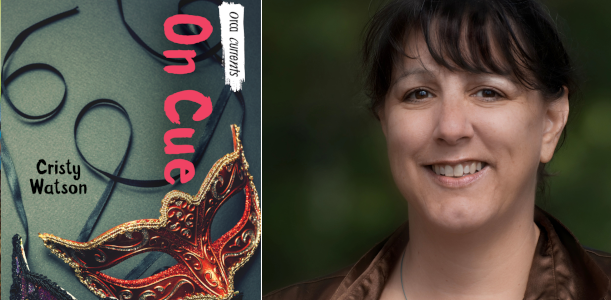#TuesdayTalk with Cristy Watson. Her novel, On Cue, is on shelves now!
Tell us about your book.
On Cue is a story about balancing dreams with responsibility. Randi wants to be an actress, but her drama class at school is cancelled. She and her classmates rally to have the class taught as an extra-curricular activity, which causes problems for Randi, since she has to watch her brother, Toby, after school.
What was the catalyst for your story?
A few things helped this story come together. I watched a class of grade five and six students perform Shakespeare’s The Tempest, and it reminded me of my step-son’s time at summer camp with Bard on the Beach and their “Young Shakespearean’s” program. I knew I wanted to write a story with a female protagonist keen on acting. But, I didn’t have the conflict figured out. Then the teachers in BC escalated job action, and as a teacher, I thought about the extra programs we were sad to lose. While drama is still offered at most schools, there are some who lost programs in the arts. The final catalyst was working with a boy at one of my school sites where I offer Peace Circles through our District Restorative Action Program. Like so many students I worked with over the course of my career, he is supported at school because autism has affected the way his brain works. I knew Randi would have to figure out how to balance supporting her brother after school, with taking drama class. From the moment these elements came together, I had my story!
What are the challenges of writing for or within a series?
I write for the Orca Currents series and one of the main challenges is the word count. Often the critics of my books say they are too short, or that there wasn’t enough character development. I wish they understood that our hi-lo books are geared towards readers who struggle to finish books, or who find reading a challenge. For the most part, these books are plot-driven, and the story unfolds over a short period of time in our character’s life. I am amazed with my fellow authors at Orca who are so capable of telling a story in 16,000 words and I marvel at how, with three books in the series, I am now able to write complete stories within the limited word count. I think I balanced character development with plot development in On Cue.
What was your favourite book as a child?
I loved many books over the course of my childhood, but during my adolescence I was drawn to books with a realistic story line, much like the ones in the Soundings and Currents series. Robert Cormier’s first-person story, I Am The Cheese, is definitely at the top of my list. It is a gritty, suspense-filled story with the kind of ending that makes you think and want to read the novel again.
In your opinion, what makes a compelling story?
For me, a story that grabs me within the first few pages and grips me to the last few pages are the kind I enjoy reading. I am drawn to stories that deal with real topics that are pertinent today. As a teen, I read stories to help me understand the more confusing aspects of growing up. I was able to sort out some of the BIG questions through novels I read. I still enjoy fantasy and speculative fiction (I’m writing one for that genre, as we speak) but with those books, I am still most interested in the story of the characters and their connections to one another.
Does your book have a niche or specialty market?
Yes, On Cue is marketed as a hi-lo book for reluctant or struggling readers and those for whom English is a second language. I believe these young people deserve stories that are compelling and aimed at their interest level. I also think it fits within the niche for performing arts and the current trend to share information through literature about young people dealing with brain trauma and diagnoses, such as autism.
Do you gravitate toward a certain genre or type of writing?
With three books in the Currents series, I guess you could say I gravitate towards writing hi-lo books. I believe that many of our struggling readers or non-readers are youth for whom books have not captured their interest or haven’t spoken to their experiences, as well as being too difficult to decode. I worked with many at-risk youth during my teaching career and many were struggling readers. I remember wishing there were books I could lead them towards, that would engage them in reading and help them to become better readers. Knowing the importance of literacy in our overall development, I wanted to be a part of the solution. Thanks to Orca for creating this niche, as I am now able to follow my dream and hopefully, continue to bring stories to this population.
What types of conversations do you hope will come out of your book?
I hope On Cue will generate discussions about brain-based issues, such as autism. I also hope it will generate discussions around the importance of keeping the arts in our public schools.
Tell us a little known or interesting fact about yourself.
I had a talking parrot as a teenager. His name was George and he had a great vocabulary. One of his favourite sayings was, “Mmmm, is that good?” and I would offer him some of my food after he asked. Apples or corn on the cob were among his favourites. His most beloved treats were foods he could ask for specifically: “How about a grape?”
 Cristy Watson is a teacher who loves reading and writing poetry and YA novels. She was born in Calgary, Alberta, and has lived in San Francisco, Kamloops, Comox, North Vancouver and now resides happily near the beach in sunny White Rock, British Columbia. Cristy hosts open-mic readings at her local coffee shop and likes to enter writing contests, especially ones where there is a challenging time limit.
Cristy Watson is a teacher who loves reading and writing poetry and YA novels. She was born in Calgary, Alberta, and has lived in San Francisco, Kamloops, Comox, North Vancouver and now resides happily near the beach in sunny White Rock, British Columbia. Cristy hosts open-mic readings at her local coffee shop and likes to enter writing contests, especially ones where there is a challenging time limit.

